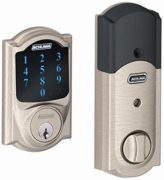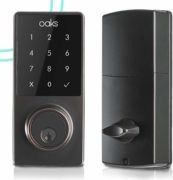List of the Best Smart Locks
1. August Smart Lock Pro
Pros
- Works with Siri, Alexa, and Google Assistant
- Keyless access for your family and friends
- 24/7 tracking capabilities for your home
Cons
- Terrible customer support services
- May not be worth the money it asks for
Bottom Line
The August Smart Lock Pro is not a perfect smart lock but does offer quite a few excellent features. With this product, you practically have the power to control everything that goes in and out of your home at the palm of your hand. It is easily one of the most compatible devices with other smart home systems and can be controlled with our smartphones.
But because of its issues, it isn't able to take the top spot in our list of the best smart locks for 2019. We are hoping, though, that its problems can be fixed and addressed so that when we try the next iteration, it would perfect its craft and give us the smart lock we deserve.
Read our in-depth August Smart Lock Pro Review here.
2. Schlage Z-Wave Connect Camelot Touchscreen Deadbolt
Pros
- Includes a hypoallergenic, washable cover layer
- Promotes natural freshness and comfort
- Helps to distribute pressure points in any sleeping position evenly
Cons
- May induce neck and back pain
- May have been made cheaply and grows mold after only a few weeks
Bottom Line
The Schlage Z-Wave Connect Camelot Touchscreen Deadbolt may have delivered an excellent smart lock for some customers, but not all are convinced by its performance, primarily because of its flaws. However, its robust features are enough for us to overlook the mistakes within its design and systems, and its added convenience is another excellent addition to our homes.
In the end, the Schlage Z-Wave Connect Camelot Touchscreen Deadbolt would have been the top smart lock if it wasn't for its poorly designed app. We can only hope that the company will fix this problem in the future and listen to the feedback from us, the consumers, so they can provide us with a smart lock that ticks all the boxes. Because at the moment, charging $160 for a product that doesn't fulfill everything we need can't be considered a good purchase.
Read our in-depth Schlage Z-Wave Connect Camelot Touchscreen Deadbolt Review here.
3. Kwikset 98880-004 SmartCode 888 Smart Lock
Pros
Cons
- The lock may fail only less than a week later
- May take up to 2-3 tries before getting it to unlock
Bottom Line
In the end, the Kwikset 98880-004 SmartCode 888 Smart Lock is an excellent addition to protecting your home while you're away or asleep, in this way, you never miss anything. While it does let users down with a few system issues, it ultimately does what it's supposed to do and provides a safe and secure product to protect our homes and valuables, while giving us the access to see who comes in and out of our home.
So if you get a unit that doesn't have any of its known software flaws, then you are in for a treat. The Kwikset 98880-004 SmartCode 888 Smart Lock will be sure to keep your home locked while providing a quick way for your family to get in and out whenever they need to while providing you with a watchful eye. All in all, the Kwikset 98880-004 SmartCode 888 Smart Lock is an excellent smart lock to add to your list of must-haves for this year, so you can be sure your home remains safe and sound.
Read our in-depth Kwikset 98880-004 SmartCode 888 Smart Lock Review here.
4. Yale YRD226-ZW2-619 Z-Wave Plus Touchscreen Deadbolt Assure Lock
Pros
- Compatible and works well with Alexa
- Uses a backlit, touchscreen keypad
- Compatible with other smart home systems
Cons
- May consume battery very fast
- May develop problems after only a few days
Bottom Line
The Yale YRD226-ZW2-619 Z-Wave Plus Touchscreen Deadbolt Assure Lock gave a fair try at providing us with a smart lock solution to our homes but also makes mistakes that could have been avoided to provide us with an excellent product. While it has excellent compatibility features with many Smart Home devices, its lackluster performance and design are enough to steer people away, along with its $250 price tag.
In the end, the Yale YRD226-ZW2-619 Z-Wave Plus Touchscreen Deadbolt Assure Lock isn't worth our money at its current state. But if the company should improve on this iteration and decide to fix all the issues they have encountered, then perhaps they can provide us with a smart lock that is worth our attention.
Read our in-depth Yale YRD226-ZW2-619 Z-Wave Plus Touchscreen Deadbolt Assure Lock Review here.
5. Oaks Smart Lock, Electronic Front Door Deadbolt
Pros
- This smart lock is easy to install
- Replaces all your keys with codes for a more convenient and secure solution
- Optional feature to automate locking after entry or exit
Cons
- May stop working after a few months
- May suffer from Bluetooth and app issues
Bottom Line
In the end, the Oaks Smart Lock, Electronic Front Door Deadbolt is a useful tool to have in your home, for your safety and security. It gives us flexible features that make it easy to use and a way to monitor our home 24/7 from our smartphones, so convenience is built right into this product. But its system problems are far too serious to overlook, which is why it can't be crowned as the best smart lock of this year.
Setting its flaws aside, we believe that if the company chooses to work on its product and improve on its performance, then we'll look forward to a better smart lock from Oaks. But even with its flaws, it's still one of the best smart lock systems out in the market now, so don't miss out on your chance at getting a fantastic product for a low price of $144. And if you get lucky and get a proper Oaks Smart Lock all in working order, then you'll never have to find another replacement for a long time.
Read our in-depth Oaks Smart Lock, Electronic Front Door Deadbolt Review here.




